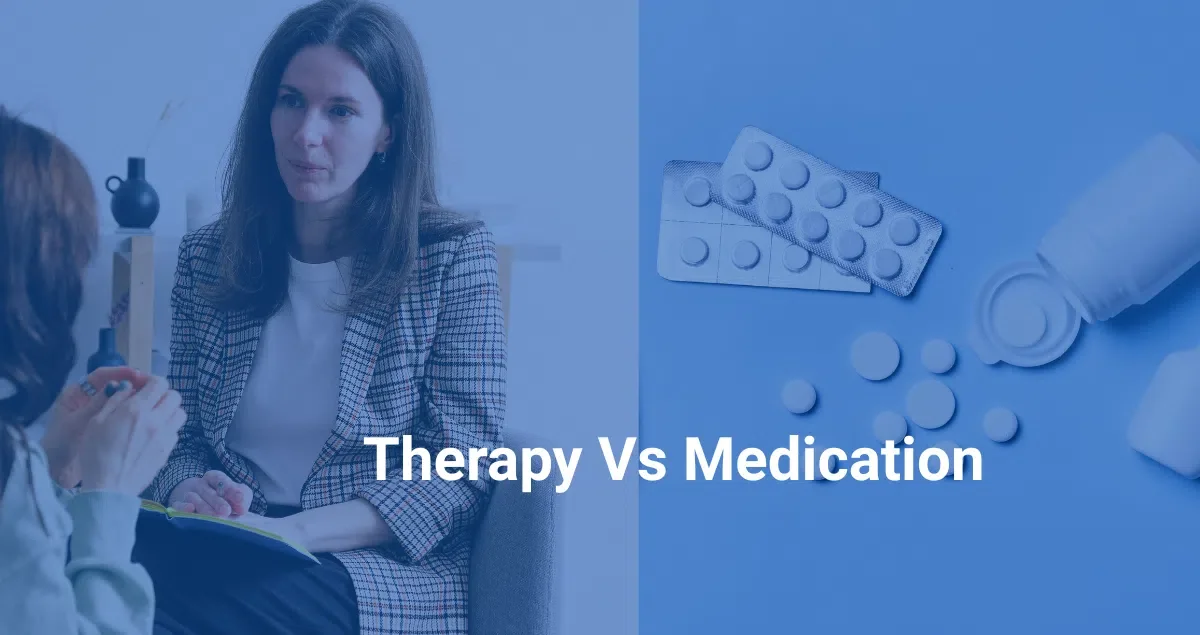Therapy vs Medication For Anxiety - What is Best for You?
Anxiety is a very common problem. Everyone experiences occasional anxiety which is a normal part of life but people with anxiety disorders frequently have excessive, intense and persistent worry and fear. People with anxiety disorders develop strong feelings of worry, unease, and fear that impacts their life negatively.
Anxiety disorders are the most common mental health issue in the US. Every year on average 40 million adults or 18% adults in US population face anxiety disorder.
Specific phobias are the common anxiety disorders that affect about 8% of adults in America.
Social anxiety affects about 7% of the adult population of the US every year.
Generalized anxiety is prevalent among 3% of adult Americans on average.
Our goal with this article is to present you with the information to help you make an informed decision about the treatment path that you would like to pursue. The options of medication, therapy or a mix of both depends on your unique situation and preferences. You will also want to consult with your psychiatrist for the best option for you to help you grow, heal and recover.
Best Treatments for Anxiety
Anxiety disorders are treatable and with the professional care most people can be healed. There are several approaches that have proved effective: Therapy, Medication, Complementary and Alternative Treatment and Transcranial Magnetic Stimulation. The two main types of treatment for anxiety are medication and therapy.
Therapy for Anxiety
Therapy can be helpful in adults to treat Anxiety. Talk therapy allows you to take about your problems with a professional who will help you overcome your challenges. Therapy will allow you to learn more about yourself. It is a powerful approach to treating emotional and mental challenges. Short-term therapy generally lasting about 12-20 sessions. The treatment helps people with the following:
- Identifying conditions that might cause issues
- Knowing their thoughts
- Finding out the negative thinking patterns
- Using high constructive alternatives to challenge such thoughts.
In this way, people can better respond to their challenges and learn something helpful for future condition, so the anxiety symptoms can be alleviated for a long time ahead.
Medications for Anxiety
There are many kinds of medications to treat anxiety usually sedatives or antidepressants. The most common drugs to treat anxiety are benzodiazepines. Medication in this class includes:
- Clonazepam (Klonopin)
- Lorazepam (Ativan)
- Diazepam (Valium)
- Alprazolam (Xanax)
Benzodiazepines are popular sedatives to gain calm effects in less time. Psychiatrist generally prescribe them especially for patients suffering from acute anxiety. These drugs do not have any side effects or significant complications. There are many related risks which include:
- Reckless behavior or increase in impulsive.
- Addiction or Chemical dependency.
- Blackout episodes and Overdose (it can happen when alcohol mixes with benzodiazepines).
- Dangerously interact with some other medications.
Selective serotonin reuptake inhibitors (SSRIs) are also effective in treating anxiety with depression. Medication in this class includes:
- Fluoxetine (Prozac)
- Sertraline (Zoloft)
- Paroxetine (Paxil)
- Citalopram (Celexa)
- Escitalopram (Lexapro)
Therapy vs. Medication
As per research, the therapy and medication have a similar effect on treating Anxiety and both are effective treatments for anxiety. It depends from person to person about what kind of treatment suits and works the best. Your unique preferences and circumstances are the factors to decide if you will need medication, therapy, or both.
What to Expect When Starting with Anxiety Treatment?
A typical anxiety treatment course would include continuous work with the psychiatrist to help you heal and grow. You will discuss your issues and treatment options. Psychiatrist will do an evaluation and work together to develop a comprehensive plan.
Therapy session is 45 minutes appointment and you will meet your psychiatrist on weekly basis. You will continue to see your psychiatrist for several months. Psychiatrist provides a personal space for support and understanding for problems and difficulties that you would like to work on and improve.
Medication for anxiety can provide relief and improve daily functioning. People take medication in conjunction with an ongoing therapy, or on its own. During these visits you and psychiatrist will focus on efficacy of the medication in helping you’re your symptom control, general health, diet, other aspects of treatment, and general updates on life and functioning.
Keep in Mind
Everyone is unique so the response to the treatment will be not be the same as another person’s response to the treatment. Some people do better with therapy and others do better with medication. It’s best to keep an open mind about treatments and continue to work with your psychiatrist to make choices, track progress and make adjustments to the treatment as needed.





